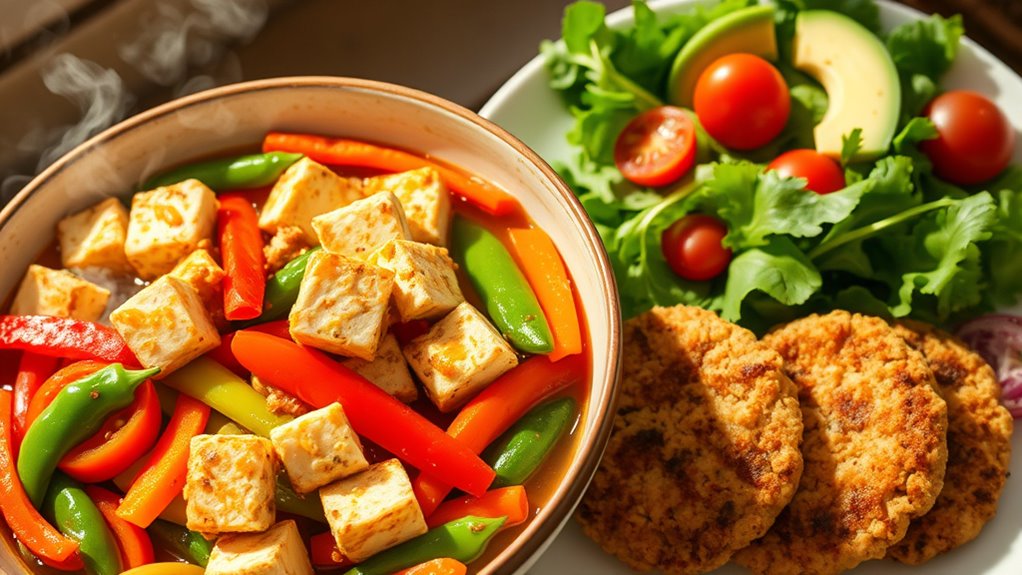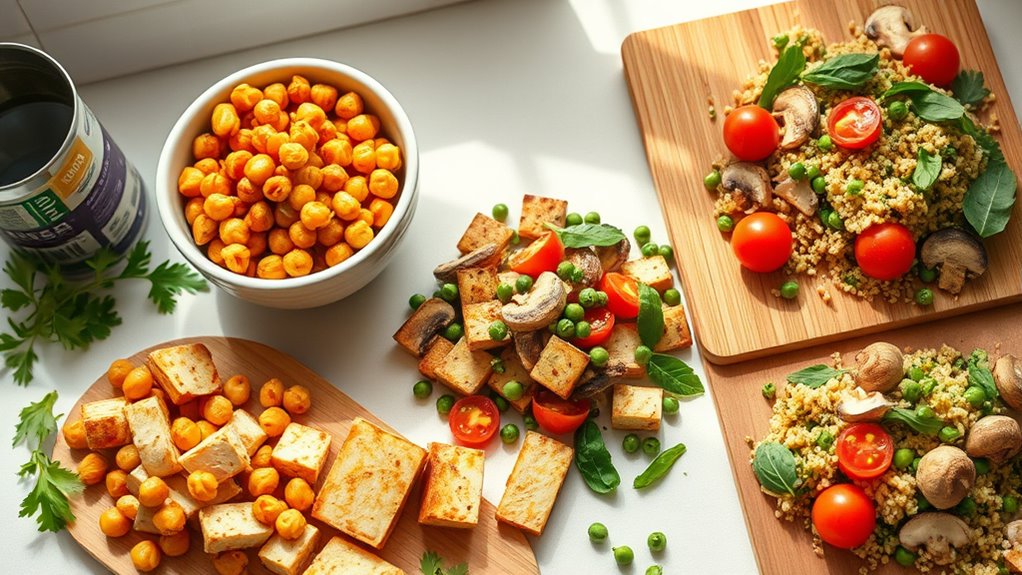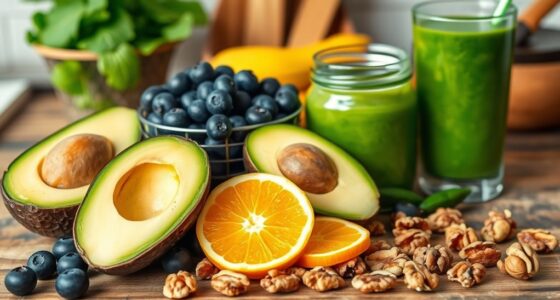Switching to plant-based proteins for weeknights helps you create quick, nutritious meals that are full of flavor. Try pre-seasoned veggie burgers, sliced veggie sausages, or tofu and tempeh—they cook fast and absorb flavors well. Use grains like quinoa or brown rice, cooked in advance, to add texture and energy. Combining these ingredients with your favorite sauces keeps meals simple yet satisfying. Keep exploring for more ideas to make nourishing plant-based dinners even easier.
Key Takeaways
- Use pre-seasoned veggie burgers or sliced veggie sausages for quick, flavorful protein options needing minimal prep.
- Incorporate plant-based grounds like lentil or mushroom crumbles for easy meatless stir-fries and sauces.
- Replace traditional meats with tofu or tempeh, sautéed in minutes for versatile, protein-rich additions.
- Prepare grains like quinoa or brown rice in advance to quickly assemble nutritious grain bowls with plant proteins.
- Combine diverse grains and plant-based proteins for satisfying, customizable weeknight meals with minimal cooking time.

Switching to plant-based proteins can make weeknight meals both quicker and healthier. Instead of relying on traditional meat, you can incorporate meat alternatives that are just as satisfying and easy to prepare. These options, like tofu, tempeh, or plant-based grounds, cook quickly and absorb flavors well, making them perfect for busy evenings. Pairing these with protein-packed grains such as quinoa, brown rice, or farro can boost the nutritional value of your meal while keeping prep simple. These grains are rich in fiber and protein, providing the energy you need without the heaviness that sometimes comes with meat-heavy dishes.
When you’re short on time, meat alternatives like pre-seasoned veggie burgers or sliced veggie sausages can be thrown into a skillet or oven for a quick meal. They cook faster than traditional cuts of meat and often require minimal seasoning or prep. For a stir-fry or grain bowl, crumbled tofu or tempeh can be sautéed in minutes, absorbing sauces and spices readily. These options are versatile, allowing you to switch up flavors and cuisines without much effort. Plus, they tend to be lower in saturated fat and contain no cholesterol, making them a heart-healthy choice.
Protein-packed grains complement these meat alternatives perfectly. For example, cooking a batch of quinoa in advance means you can just toss it with sautéed vegetables and your favorite plant-based protein for an instant, nutritious meal. Brown rice is another excellent option, adding a chewy texture and nutty flavor that pairs well with spicy or savory sauces. Farro or barley can also add variety and texture, making your meal more satisfying. These grains can be cooked in bulk at the start of the week and stored in the fridge, so you’re always ready to assemble a quick, wholesome dish. Additionally, understanding bioluminescence can inspire innovative food presentation techniques, such as glowing dishes for special occasions.
Frequently Asked Questions
Can Plant-Based Proteins Replace All Animal Proteins in Any Dish?
Yes, you can replace all animal proteins with plant-based options in many dishes. Meat substitution works well, especially when you adapt flavors to suit the plant-based ingredients. You might need to tweak seasonings or cooking methods, but overall, plant-based proteins can mimic the texture and taste of traditional meats, making them versatile for various recipes. With some flavor adaptation, you can enjoy fully plant-based versions of your favorite meals.
Are There Any Allergens Common to Plant-Based Protein Sources?
Imagine biting into a savory burger, but beware—soy allergies can turn that experience into a problem, as soy is a common allergen. While plant-based proteins are often safe, some may cause issues due to gluten cross reactivity, especially in products like seitan. Always check labels carefully, and if you have soy allergies or gluten sensitivities, opt for alternatives like lentils or nuts to avoid allergic reactions.
How Do Plant-Based Proteins Compare Nutritionally to Animal Proteins?
Plant-based proteins often have comparable nutritional content to animal proteins, but their amino acid profile can differ. You get essential nutrients like fiber, vitamins, and minerals from plant sources, though some may need to be combined to guarantee complete amino acids. By choosing a variety of plant proteins, you can meet your nutritional needs, supporting muscle growth and overall health just like animal proteins do.
What Is the Best Plant-Based Protein for Quick Weeknight Meals?
Imagine a busy kitchen where tofu’s versatility shines—you can quickly scramble it, stir-fry it, or add it to soups, making it ideal for weeknight meals. Chickpeas offer unmatched convenience; they’re ready to eat straight from the can or quick to cook, adding protein and fiber effortlessly. Both are excellent choices, but tofu’s adaptable nature makes it the top pick when you need a fast, satisfying plant-based protein.
Do Plant-Based Proteins Affect Meal Preparation Time Significantly?
Plant-based proteins can improve your meal prep efficiency by cooking quickly and requiring minimal kitchen equipment. Many options like tofu, tempeh, or canned beans are fast to prepare, saving you time during busy weeknights. You won’t need specialized tools, making your kitchen setup simpler. Overall, incorporating these proteins streamlines your meal prep, helping you whip up nutritious, plant-based dishes without lengthy cooking times or complicated equipment.
Conclusion
By swapping traditional proteins for plant-based options, you can make your weeknight meals healthier and more sustainable. Did you know that adopting plant-based diets can reduce your carbon footprint by up to 50%? Every small change counts, so try incorporating these swaps into your routine. Not only will you enjoy delicious, nutrient-rich meals, but you’ll also contribute to a healthier planet. Start today, and make a positive impact—one meal at a time.







